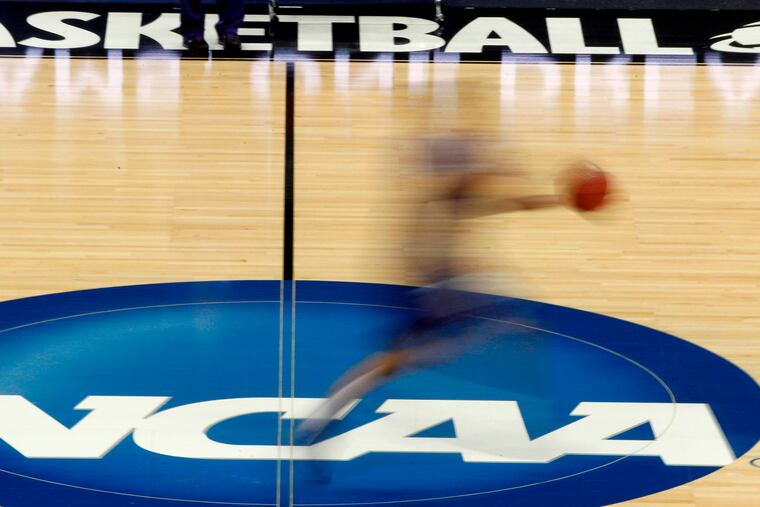The NCAA says student athletes can be compensated, but what exactly does that mean?
Tuesday’s announcement does not mean that college athletes can immediately start earning cash — or that they ever will.

In a landmark decision that could change the dynamics and economics of college sports, the NCAA’s top executives unanimously voted on Tuesday to allow college athletes to profit off their name, image, and likeness “in a manner consistent with the collegiate model.”
But what exactly does that mean?
In September, California lawmakers signed a bill that starting in 2023 permits the state’s college athletes to be paid through sponsorships, endorsement deals, autograph signings, and other income opportunities. Other states, including Pennsylvania, South Carolina, and New York, have talked of introducing similar bills.
Public outcry and legislative action pressured the $1.1 billion organization to revisit and “modernize” its pay-to-play regulations, but Tuesday’s announcement does not mean college athletes can immediately start earning cash — or that they ever will. Here’s what we know so far about what the NCAA is doing.
What are the NCAA’s current rules on athletes getting paid?
NCAA regulations strictly prohibit students from making money off any sports-related activity — including endorsements, appearances, advertisements, and even monetizing social media channels — beyond scholarships to retain their amateur status.
What will change?
Student athletes will have the “opportunity to benefit from their name, image, or likeness." But “benefit” does not explicitly mean they may earn money. For athletes to remain students rather than employees, these benefits will likely have to be tied to education, said Jon Solomon, editorial director of the Aspen Institute’s Sports and Society program.
“This could mean, ‘OK, we will pay for your graduate school or pay for you to return to school later in life,’” said Solomon, an award-winning sports journalist. “Or it could also mean they’ll pay for the athlete’s health insurance.”
The NCAA does not want its sports to be seen as professional and having athletes being paid to play, he said.
» READ MORE: A-10’s Bernadette McGlade favors shift in college amateurism landscape | Mike Jensen
So how might athletes be compensated?
It’s not clear, but there are a few ideas.
The NCAA could use a performance-based model, which it currently allows for athletes who participate in the Olympics and can receive bonuses for winning Olympic medals.
The association could also adopt a “group licensing model,” said Solomon, in which athletes pool their rights to benefit equally from contracts with brands or licenses with video games.
When can athletes expect changes?
The NCAA did not say when the new regulation will be enacted, but noted that it would “continue to gather feedback through April on how best to respond to the state and federal legislative environment and to refine its recommendations on the principles and regulatory framework.”
It has asked each of its three divisions to “immediately consider updates to relevant bylaws and policies” and “create any new rules beginning immediately, but no later than January 2021.”
Aren’t student athletes already being paid?
In certain ways, both legally and illegally, yes.
Some student athletes who compete in the Olympics may receive NCAA-permitted medal bonuses for their performance. In 2016, University of Texas swimmer Joseph Schooling received a $740,000 bonus from Singapore for winning gold, for instance.
College football players may receive bowl gifts of up to $550, which can be things like a fancy electronic or a Visa gift card.
But former New Orleans Saints running back Reggie Bush was forced to return his 2005 Heisman Trophy after receiving more than $300,000 in compensation from marketing agents. Heisman-winning quarterback Cam Newton’s eligibility was questioned after his father allegedly demanded $180,000 from Mississippi State.
Some top athletes, like gymnast Simone Biles and swimmer Katie Ledecky, forgo or cut short collegiate careers because they can’t afford to not go pro.
How might Title IX affect athlete compensation?
The impact of the landmark law prohibiting sex discrimination in college sports will depend on what the model is and how it is executed.
“If this were a true free-for-all and every athlete could negotiate for him or herself to get the best endorsement deal possible, then the university’s obligation wouldn’t be affected,” said Michael Rubin, a San Francisco-based lawyer who represented Rutgers University quarterback Ryan Hart’s lawsuit against EA Sports over the use of his likeness.
“The rules are likely to be structured so the money doesn’t go exclusively to single prominent individuals,” he said. “They’re going to have to take the proceeds, give it principally to people who generate the money, but take a portion and distribute it to others to promote solidarity and teamwork.”
But how that distribution works among teams remains an open question.